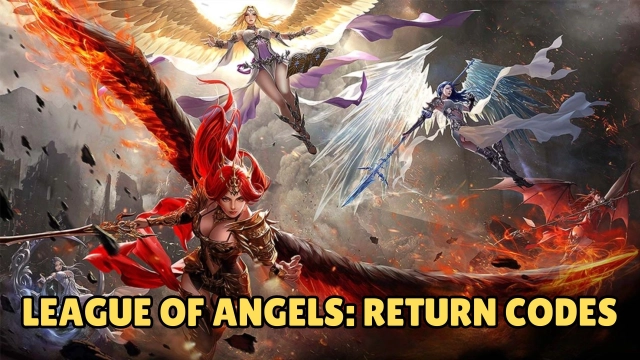League of Angels: Return Team Building Guide with Tips
Get ready for League of Angels: Return team building success! This guide helps you assign roles to villagers to form the best teams against Seethe threats. With simple tips on character abilities and strategic placements, you can build powerful lineups effectively. Build the best team, and dominate the battlefields of Seethe!
Contents

Understand the Roles
League of Angels: Return team building involves assigning villagers to various roles to protect the character from the Seethe attacks. First, it's important to understand the League of Angels: Return characters and how each can contribute to your team. Below are the roles, their functions, and the costs associated with assigning them:
|
Role |
Description |
Cost (Crystals) |
|
Woodcutter |
Woodcutter is a melee fighter wielding an axe. Excelling in close-range attacks against ground-based Seethe. |
50 |
|
Archer |
Ranged units equipped with bows that deliver fast, consistent damage to both ground and flying Seethe. They are ideal for maintaining safety and should be positioned in elevated spots. |
50 |
|
Ascetic |
Support units that use demon abilities to slow enemies, providing crowd control buffs. They are effective against fast-moving or numerous Seethe. |
150 |
|
Thief |
Thieves are utility units skilled at unlocking buried or locked chests for rewards at day time. They are non combat characters. They are hiding from the battles during the night time. |
50 |
|
Sumo Wrestler |
A durable melee fighter known for their high health, drawing aggro and absorbing damage. They excel against large enemies or bosses. |
300 |
|
Shaman |
Shaman is a healing unit that performs a ritual dance to recover health for themselves and nearby villagers. They are less effective in direct combat, focusing instead on enhancing team performance. |
150 |
|
Spearman |
This is a durable melee fighter with a spear, effective against larger ground-based Seethe. Excellent for holding choke points. |
100 |
|
Matchlock |
These are the marksmen that handle a Matchlock, excelling at long-range attacks with high damage. They are particularly effective at dealing with flying Seethe. |
150 |
|
Priest |
The Priest is adept at calming raging Seethe; by reciting a chant. They can dispel the enchantments on Enhanced Seethe within range. |
100 |
|
Cannoneer |
This heavy ranged unit delivers high area-of-effect (AOE) damage and is effective against small and medium Seethe. They wield a hand cannon but have a slower attack speed in exchange for their high AOE damage. |
150 |
|
Sorcerer |
A late-game unit dealing high damage to bosses, breaking resist gauges quickly. They provide boosts to team damage from safe positions and can inflict damage on any type of Seethe, whether flying or grounded. |
300 |
|
Ninja |
Ninjas are the fastest, most mobile melee units, capable of decent damage but lacking durability. They excel in hit-and-run tactics, using katanas to attack ground-based Seethe and kunai to target flying Seethe. |
300 |

Team Building Strengths
Now that you understand the roles and functions of the characters that you can assign to your villagers. Next, we bring you how these villagers can be used for League of Angels: Return team building. Each character has unique strengths that should be used wisely. Here are some League of Angels: Return tips:
|
Role |
Using Strategy and Placement |
|
Woodcutter |
Use Case: Early stages or when crystals are lower. Placement: Near side gates or weaker enemy paths. |
|
Archer |
Use Case: Ideal for dealing consistent damage. Placement: On elevated platforms to maximize range and avoid melee combat. |
|
Ascetic |
Use Case: Essential for stages with fast or numerous enemies (e.g., enemy swarms or bosses). Placement: Near choke points to slow enemy advances. |
|
Thief |
Use Case: They are best during day time for finding chests. Placement: Near chests during the day. |
|
Sumo Wrestler |
Use Case: Stages with large enemies or bosses. Placement: Near main gates or bosses to absorb damage. |
|
Shaman |
Use Case: Stages required with enhanced team performance. Placement: Near key units like Archers or Sorcerers to boost their effectiveness |
|
Spearman |
Use Case: Hold choke points from tough enemies. Placement: Near Torii Gates to tank damage. |
|
Matchlock |
Use Case: Stages with spread-out enemies or elevated platforms. Placement: Position safer places and higher positions. |
|
Priest |
Use Case: Crucial for tough stages or boss fights where units take heavy damage. Placement: Safe spots near tanky units |
|
Cannoneer |
Use Case: Stages with enemy hordes or narrow paths. Placement: On platforms or behind tanks to avoid direct combat. |
|
Sorcerer |
Use Case: Can be used for enemies with higher HP. Placement: Behind tanks or on platforms to safely deal damage. |
|
Ninja |
Use Case: Stages with spread-out enemies or for quick repositioning abilities. Placement: Flexible; used to flank or harass enemies away from main defenses. |
Best Team Compositions
Using the roles explained earlier, you can build strong League of Angels: Return teams to defeat enemies. Below are two team setups—one balanced and one defensive—designed to handle different battle situations. These teams focus on both attacking and defending to win battles effectively.:

Balanced Team Setup
-
Team Composition: 3 Archers, 2 Spearmen, 1 Ascetic, 1 Priest
This team is ideal for general stages you need to complete. It features Spearmen on the frontline to tank at key chokepoints, while Archers deal consistent damage from a distance, allowing them to attack safely from near the Torii gates. The Priest provides healing support, and the Ascetic slows down incoming Seethe as they approach the Torii gates. This setup is versatile and effective for most stages.
Defensive Setup
-
Team Composition: 2 Archers, 1 Sumo Wrestler, 2 Spearmen, 1 Ascetic, 1 Priest, 1 Sorcerer
This team is well-suited for battling bosses with higher HP. It leverages strong defensive abilities, with the Sumo Wrestler and Spearmen tanking near the bosses while the Archers and Sorcerer deal damage from a distance. The Ascetic is positioned to slow down enemies while also contributing damage. This combination is effective in managing battles against high-HP bosses.
Best Strategies for Team Building
League of Angels: Return team building requires careful decision-making when assigning roles to your villagers. Here are some League of Angels: Return tips and tricks to help you.
-
Assign Roles for Your Villagers Wisely: Focus on balancing your crystal resources and assign roles that are appropriate for the amount of crystals you have. Consider the abilities of the Seethe units that you might encounter in your village.
-
Upgrade Early Units: Don’t overlook Woodcutters and Archers. Their low cost and potential for upgrades keep them viable throughout the game.
-
Experiment Freely: Each stage features unique enemy patterns. If your current setup is struggling, try swapping out a Ninja for a Woodcutter or a Shaman for a Priest to adapt to the challenges ahead.
-
Understand the Boss's Strengths and Weaknesses: Each boss has distinct strengths and weaknesses. Identify these first, then adjust your team accordingly to defeat them effectively.
Special Note: Every detail in this guide is listed here based on the pre-release information. So, once the game is launched, these details and strategies can be changed. But don’t worry, stay in touch with us as we will update this guide with the most up to date tactics once the game is launched.

Multi-instance & Sync: Operate multiple accounts simultaneously to improve rerolling efficiency
One-key Macro:Record and auto-execute your actions, making resource farming and dungeon clearing a breeze
High FPS & Keyboard Mapping:Smoother combat, precise skill activation, and no lag or frame drops
Video Recorder:Record highlights and turn them into shareable videos
People Also Ask
What are the best tanking characters in League of Angels: Return?
The best tanking roles in League of Angels: Return are the Sumo Wrestler and the Spearman. They have higher HP, allowing them to effectively defend against incoming attacks.
Who is the best healer in League of Angels: Return?
The Shaman is considered the best healing unit in League of Angels: Return. They perform a ritual dance to recover health for themselves and nearby allies.
Is the Thief better for battles?
No, the Thief is a non-combat character that hides during battles. It excels during the daytime for finding hidden chests.
Conclusion
This brings you to the end of the League of Angels: Return team building guide. With all the character details provided and an understanding of their positioning, you can effectively build your own team to face the challenges ahead. Remember to understand each character's role, assign appropriate roles to your villagers, and create a solid strategy for any battle you encounter.

I’ve spent over 6 years exploring MMO, RPG, and Simulation games, breaking down complex mechanics to create guides that make gaming easier and more fun. I am a 24 year old computer science student who love studying computer systems, design patterns, and numerical planning in games as those are my field. Beyond that, I enjoy photography and cinematography in general. For me, sharing knowledge is as rewarding as playing itself


League of Angels: Return





